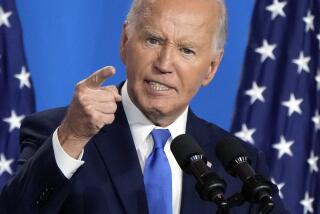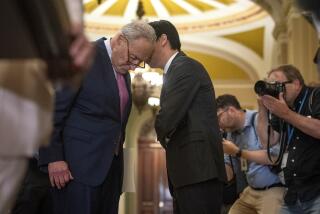NEWS ANALYSIS : Clinton Aides Hear Political Clock Ticking With Alarm
- Share via
WASHINGTON — Bill Clinton is running out of time.
As the President returns from a week of celebration commemorating the 50th anniversary of D-day in Europe, that is the increasingly anxious conclusion of top Administration aides and Democratic strategists, as well as the cheery expectation of their Republican opponents.
It is not just that the legislative clock has ticked ominously close to quitting time on Clinton’s major initiative--health care reform. Even more seriously for the President, he appears to be running out of time with voters.
Clinton, his aides concede, faces an increasingly frustrated and uncharitable electorate, dismayed by the roller-coaster nature of his presidency, tired of revelations about his personal life and impatient to see actual delivery on his promises of change.
If Clinton cannot turn around that frustration relatively soon, his advisers fear he faces twin--and potentially crippling--blows: first, that dismay with him will fuel large Democratic losses in the congressional elections this fall, enough to deny him a working majority in Congress; and, second, that the current voter discontent with his performance could harden into a firm judgment that he is inadequate to the job.
Voters “feel it’s not working out right,” said a senior Administration official. Despite consistently encouraging economic news, “people still don’t have confidence in the Administration on economic matters,” he added. More and more, “there’s an accumulation of people saying: ‘Oh, man, they’re just not making progress.’ ”
For most of the first year of the Administration, “voters kept saying they wanted him to succeed, they were hopeful,” said Democratic pollster Celinda Lake. “Now they’re expressing considerably more frustration.”
To avert the dangers he faces, aides say, Clinton needs to begin with a few major victories--and soon. “We have a window of about three months,” the senior official said. “After you hit Labor Day, forget it.”
Clinton hopes to begin achieving that goal by using the goodwill that even Republican pollsters say they believe has been generated by his successful participation in the D-day commemorations.
Building on the theme he enunciated in Europe--that the current generation must meet its challenges the way the last generation met the challenge of World War II--he hopes to press Congress to complete action on an anti-crime bill that has been moving slowly through both houses for nine months and on his much-debated health care reform proposals. In addition, Clinton plans next week to unveil his welfare reform plan, which has been stalled for months by internal debates and congressional worries.
Even though Clinton’s aides say they believe that he can overcome his current problems, they do not deny them.
“People want results and they want action,” said Clinton adviser Mandy Grunwald. In the absence of forward movement, she added, “it’s a long process, and voters find it very frustrating.”
Voters are “reaching the conclusion that not much is getting done,” said Clinton political aide Paul Begala, adding that it is “the wrong conclusion” and “I think we can dissuade them.”
Clinton’s position can be seen in polls in which his approval ratings have generally been lackluster--in the 45%-to-50% range, depending on the poll. Those ratings are not the worst of his presidency, but they are notably bad, considering that the economy has improved steadily for the last year and that unemployment now stands at 6%.
Various polls indicate that Americans are more likely than they were a year ago to see Clinton as someone willing to fight for his beliefs. Unfortunately for the President, his ratings for honesty, integrity and character have steadily declined.
A host of troubles have contributed to Clinton’s current difficulty, according to pollsters and strategists from both parties. A series of foreign policy reversals--including the U.S. mission in Somalia that turned sour and the inability of the West to deal with the war in Bosnia--have dominated the news, hardening doubts about the President’s leadership ability. Major domestic initiatives, most notably health care reform, have been caught up in the toils of the legislative process, exposing voters to a steady barrage of stories about legislative gridlock. And, finally, the raft of stories about Clinton’s personal life and about White House staff problems have increasingly begun to grate on people.
“People are getting impatient,” said Republican pollster Frank Luntz, describing the results of focus groups made up of moderate, Democratic-leaning voters in Wisconsin.
The impatience does not stem from any one incident, Luntz says. “It’s one story after another story after another. It’s none of it and it’s all of it. You talk to people and they’re no longer willing to give him a break.”
In that context, Clinton suffers badly, even from incidents that White House officials say they handled relatively well, such as the rapid resignation of David Watkins, the former White House director of administration, after he used a military helicopter to fly to a golf outing.
“There is a frustration out there from people that they are sick of hearing about and reading about the President’s problems,” said Democratic National Committee political director Don Sweitzer, who irritated the White House recently when he said that some Democratic candidates might not want Clinton’s help this fall.
All these problems, while they would be serious for any President, pose a particular threat to Clinton.
When Ronald Reagan became President, he preached an anti-government message to an electorate that was disillusioned with Washington and already inclined to head in conservative directions. When Reagan ran into difficulties, as he did during the 1982 recession, he could gain time by riding a largely conservative tide.
Clinton, by contrast, has been seeking to revive faith in government among voters still deeply skeptical of Washington’s ability to get things done. To overcome doubts about government, key advisers--including pollster Stanley B. Greenberg--have long pushed a “show me” strategy in which Clinton would convince Americans to moderate their skepticism about government by getting key programs, such as health care reform, enacted and by proving to the nation that they would work.
“Success breeds success. There’s a certain momentum that you develop,” Grunwald said.
That strategy, in turn, requires convincing voters that Clinton can be trusted to break Washington gridlock and run the government effectively. That trust, however, appears to be seriously eroded. If voters do not believe in Clinton’s effectiveness and credibility, his advisers concede, they will not support passage of his programs. And if his programs do not pass, the perception of his effectiveness will wane further.
Clinton “can dance along that precipice for another year or two or even three, maybe,” said William Kristol, head of the Project for the Republican Future and a former chief of staff to Vice President Dan Quayle. Republicans who predict that Clinton will simply self-destruct are failing to take into account the enormous political skills and determination that have enabled him to come back from seeming disaster before, Kristol says.
“But he’s running pretty close to the edge, and there’s not a lot of room,” he added. “That’s why this is such a critical time for him. He really needs a good domestic win.”
Clinton’s top aides insist that they have several reasons to hope those victories will come, beginning with the crime bill, which they hope to see emerge from Congress soon. Victory on that front, they hope, will bolster Clinton’s position on the main battle--health care.
But even if the White House can achieve those victories, the pace will be far from what Clinton strategists once had hoped. At the beginning of the year, those strategists dreamed that the crime bill, with its tougher sentences and 100,000 new police officers, would be passed before Easter, that health reform would be on the House and Senate floors this summer and that a welfare reform package would be debated in the fall.
Despite the delays, however, Clinton aides say they hope that once the President achieves a few victories, voters will begin to re-evaluate other accomplishments that the public seemingly has discounted. White House officials point to enactment of such programs as the new family-leave law, the start of the national service program for college students and last fall’s passage of the free trade agreement with Mexico and Canada.
Most important, they argue that, because every Republican in Congress voted against last year’s budget bill, Democrats are well-positioned to claim credit for the economic improvements of the last nine months.
Right now that strategy does not appear to be faring well. White House officials were taken aback, for example, by the success that Rep. Michael Huffington (R-Santa Barbara) had with a flurry of advertisements attacking Sen. Dianne Feinstein (D-Calif.) for her vote on the budget measure, which included some new taxes. The ads helped Huffington win the GOP Senate nomination, and he will try to wrest the Senate seat from Feinstein in November.
But Clinton advisers say they believe that public attitudes will shift if the overall political context changes.
“In the middle of success, he (Clinton) gets credit for everything else,” Grunwald argued. “When the process seems bogged down, it almost blocks everything else.”
As Kristol notes, Clinton repeatedly has proven able to come back from deep political trouble. Indeed, the roller-coaster ride of his presidency has a certain seasonal quality: Two years ago in May and June, Clinton fell to third place in polls behind then-opponents George Bush and H. Ross Perot. Last year, May and June also marked a low point in which Clinton seemed to face defeat over his budget plan and was forced to jettison C. Lani Guinier as his choice for assistant attorney general for civil rights. In both cases, Clinton used the summer and fall to fight back.
Coming back this time, however, could be more difficult than ever. As focus groups and polls indicate, Clinton may have become overexposed, wearing out his welcome with many voters. That could be a significant problem for an Administration that has grown dependent on the President’s ability to be the chief salesman for his programs.
Moreover, only some of the current voter frustration with Clinton stems from the continued sense of Washington gridlock--a sense that some large-scale victories could reverse. Much of the discontent grows, instead, from worries about Clinton’s character.
“He’s just not been able to shake people’s doubts about his credibility,” said Rep. Dick Swett (D-N.H.), a moderate Democrat from a marginal district who says he worries about the effect that Clinton’s troubles may have on his own reelection.
In recent focus groups in California, Lake says, the sort of pro-Clinton voters who a few months ago might have risen to Clinton’s defense sat quietly when others in the group attacked him. “They didn’t argue, they didn’t nail the other people back,” she said. “People just don’t want him to go up and down anymore. They are getting tired of the roller coaster.”
More to Read
Get the L.A. Times Politics newsletter
Deeply reported insights into legislation, politics and policy from Sacramento, Washington and beyond. In your inbox twice per week.
You may occasionally receive promotional content from the Los Angeles Times.











